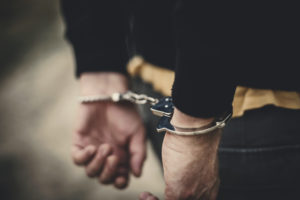Whether you are arrested for drunk driving, drugs, domestic violence, or any other type of crime in Alberta, you’re probably anxious about the road ahead. An experienced criminal defence lawyer can protect your rights and help you navigate the bends and curves of the criminal justice system.
Below is information on what happens after you are arrested:

Arrest
Upon arrest, the police are required to tell you i) the reason for your arrest; and ii) that you have the right to speak to a lawyer. It is always in your best interest to speak with a lawyer prior to answering any questions the police may ask. Remember, it is your Constitutional right to speak to a lawyer before providing any information to the police, other than identifying yourself. If you wish to speak to a lawyer, the police are obligated to provide you with a reasonable opportunity to contact a lawyer, and to refrain from questioning you or eliciting any evidence from you until you have been provided with an opportunity to do so.
One of the biggest misconceptions is that you are obligated to speak to the police and answer their questions. To the contrary, the right to remain silent is one of the most powerful rights a Canadian citizen is afforded and we strongly suggest that you exercise that right upon being detained or arrested.
Bail hearing
After your arrest, the Edmonton Police Service (EPS) or the Royal Canadian Mounted Police (RCMP) may release you on paperwork, commonly known as a“Promise to Appear,” “Appearance Notice” or an “Undertaking.”
Or alternatively, depending on the seriousness of the allegations and/or your past criminal history, they may bring you before a judge for judicial interim release — also known as a “bail” hearing. Typically for your bail hearing, you will be able to attend the hearing via video or phone conference.
The purpose of the bail hearing is to determine whether you should be held in custody or released until your trial. Typically, you can only be held in custody if the Crown can demonstrate that it’s required for one of the following three reasons:
- To guarantee that the accused person will appear in court as scheduled (such as if they are deemed a flight risk);
- To protect the public (such as if there is a “substantial likelihood” they will commit an offence or endanger others upon release);
- If, considering all circumstances, the accused person must remain in custody in order to “maintain confidence in the administration of justice” (often due to the gravity of the alleged offence and/or the strength of the case against them)
In certain serious circumstances, depending on your charges and/or whether you have other outstanding matters, it is your responsibility to show why you should not be held in custody.
After the bail hearing is conducted, if the judge determines that you should not be held in custody, they may set specific conditions for your release. While the exact requirements will vary based on your case, you may have to pay money to the court, bring someone who can supervise and vouch for you, or follow certain rules.
Your first appearance
If you are arrested and charged with a crime, even a minor one, you must appear in court, unless you have retained a lawyer who can appear on your behalf. Check the appearance notice in the release documents you received from the police — mark the date and time in your calendar.
Most people who are charged with a criminal offence mistakenly assume that they are required to prove their innocence on their first appearance. That is not the case. Your first court appearance is in a “docket” courtroom, where you will be required to advise the judge as to the status of your matter. Here are some things you should know prior to your first court appearance:
- It’s in your best interests to hire a criminal defence lawyer as soon as possible. Your lawyer can explain the process, get you prepared, and protect your rights.
- Be sure to consult the Case Management Offices Protocol if you do not hire counsel. Duty counsel can guide you through the steps and provide you with limited legal advice.
- Do not wait until the last minute to ask for help. If you require more time to hire a defence lawyer or receive legal guidance, contact a court officer.
- You can obtain a copy of the police investigation, charges, and evidence against you by contacting the Crown prosecutor’s office.
- Prior to making your plea – guilty or not guilty – it is of utmost importance that you obtain a copy of the police investigation, charges, and evidence against you. You can obtain a copy of the investigation, which is commonly referred to as “disclosure”, by contacting the Crown prosecutor’s office.
- Get ready for questions from the judge. If you are in the process of hiring a lawyer, you should advise the judge of this at your first appearance and be prepared to inform the judge of the steps you have taken to hire a lawyer. If you have not received full disclosure from the Crown prosecutor by the time of your first appearance, you should also advise the judge of this.
Take your first court appearance seriously. Hire an experienced criminal defence lawyer to help you understand the rules and procedures of the criminal justice system.
Your rights
According to the Charter of Rights and Freedoms, every Canadian citizen is protected by a number of rights if they are arrested.
Some of the most significant rights include:
- To be informed, without unreasonable delay, of the specific offence(s);
- Upon arrest or detainment, to be informed of the right to counsel, and be provided with a reasonable opportunity to contact counsel;
- To be tried within a reasonable time;
- Not to be compelled to be a witness against himself;
- To be presumed innocent until proven guilty in a fair and public hearing by an independent and impartial tribunal;
- Not to be denied reasonable bail without cause;
- To trial by jury where the maximum punishment for the offence is at least five years imprisonment, except in a military case tried before a military tribunal;
- Not to be found guilty of any act or omission, which at the time of commission was neither an offence under Canadian or International law nor a crime under the general principles of law recognized by the community of nations;
- If finally acquitted of the offence, not to be tried again and if finally found guilty and punished for the offence, not to be tried or punished for it again; and
- To be subjected to the most lenient punishment if the possible sentence changes between the commission of an offence and the date of sentencing.
Every citizen also has certain inalienable rights such as security against unreasonable search and seizure and protection against unlawful arrest or detainment.
When should you contact a defence lawyer?
If you are arrested or detained for any reason — contact a lawyer. The criminal justice system and legal procedures that operate within it can be complicated and unforgiving. Without a knowledgeable guide, you risk your reputation, freedom and livelihood.
Here are some examples of when you should call a criminal defence lawyer:
- Edmonton Police Services call or knock on your door and ask you to answer a “few questions.”
- You are about to make your first court appearance.
- Law enforcement officers ask you to sign anything.
- You’re arrested for any type of crime — traffic, drunk driving, drugs, violent and domestic offences, financial crimes, theft, sexual offences.
- You are being investigated for a crime
- You believe you are being investigated for a crime.
- You committed a crime but are not yet being investigated.
When you are arrested, remember that you can contact your lawyer immediately after you are brought to the police service station and booked. You do not have to answer any questions that police ask prior to speaking with a lawyer, besides those about your identity. Once you are booked, politely request to speak with your lawyer.
Contact an experienced team of Edmonton criminal defence lawyers
For the last 30 years, Chadi & Company has fought passionately to protect the rights of Alberta residents. If you or a loved one is arrested for any type of crime, call (780) 429-2300 or visit our Edmonton office and schedule an initial consultation today.






